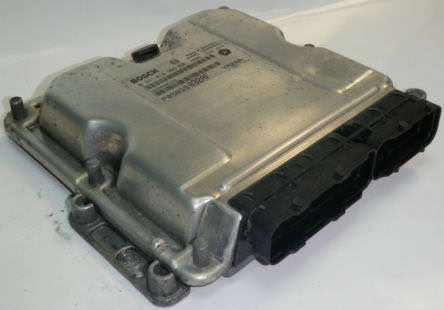In the world of automotive engineering, the integration of electronics and software has revolutionized the way modern vehicles operate. One critical component of this transformation is the Electronic Control Unit (ECU), a powerful computer that governs a car’s engine, transmission, and various other systems. In the context of BMW ECU programming and software updates are vital for enhancing performance, safety, and overall driving experience. In this article, we will explore the intricacies of BMW ECU programming and software updates, shedding light on what every BMW owner needs to know.
The Role of the ECU in a BMW
The Electronic Control Unit, often referred to as the ECU, is the brain of a BMW vehicle. It consists of a network of microprocessors and sensors, responsible for controlling various vehicle functions. The ECU regulates the engine’s performance, transmission, emissions, and more. It collects data from sensors throughout the vehicle and adjusts settings in real-time to optimize performance, efficiency, and safety.

The ECU plays a critical role in the following aspects of your BMW ECU:
- Engine Management: The ECU controls the fuel injection, ignition timing, and air/fuel mixture to ensure the engine operates efficiently while maximizing power and minimizing emissions.
- Transmission Control: It manages gear shifts, adapting to your driving style and road conditions to provide a smooth and efficient driving experience.
- Safety Systems: The ECU is linked to safety features such as anti-lock brakes (ABS), traction control, and stability control, ensuring the vehicle’s safety in various driving situations.
- Emissions Control: It monitors and adjusts various components to meet stringent emission standards, reducing the environmental impact of your vehicle.
- Fuel Efficiency: The ECU plays a crucial role in optimizing fuel consumption, making your BMW more environmentally friendly and cost-effective to drive.
- Adaptive Systems: It handles adaptive systems such as adaptive cruise control and active steering, which enhance driving comfort and safety.
- Infotainment and Comfort: The ECU is also responsible for managing infotainment systems, climate control, and other comfort-related features.
Given the ECU’s central role in a BMW’s operation, ensuring that its software is up to date and properly programmed is essential.
The Need for ECU Programming and Software Updates
As automotive technology advances, so does the complexity of a BMW ECU. ECU software evolves to incorporate new features, improve performance, enhance safety, and address potential issues. Here are some key reasons why ECU programming and software updates are necessary:
- Performance Enhancements: Manufacturers release updates to optimize engine performance, potentially increasing horsepower, torque, and responsiveness.
- Fuel Efficiency: Updates can improve fuel efficiency by optimizing engine management and other systems.
- Safety Improvements: New software can enhance safety features and systems, keeping drivers and passengers safer on the road.
- Emissions Compliance: Software updates can help BMWs meet stricter emission standards, reducing their environmental impact.
- Bug Fixes: Software updates address software bugs or glitches that may affect various vehicle systems.
- Recalls and Technical Service Bulletins (TSBs): ECU updates may be required to address safety recalls or known issues identified in TSBs.
- Compatibility: Updates may be necessary to ensure your BMW ECU software is compatible with new hardware or components.
How to Perform ECU Programming and Software Updates
Performing ECU programming and software updates on your BMW requires a few steps:
- Visit an Authorized Service Center: BMW owners are advised to visit an authorized BMW service centre to ensure that updates are performed correctly. Authorized service centres have access to the latest software and expertise.
- Diagnostic Check: The technician will perform a diagnostic check to identify which ECU modules require updates. They will also check for any fault codes and recalls related to your vehicle.
- Software Installation: Once identified, the technician will install the necessary software updates. This process typically involves connecting your BMW to a specialized computer and downloading the updates.
- Testing and Verification: After installation, the technician will test the updated systems to ensure they are functioning correctly. This includes road tests to verify performance and safety features.
- Documentation: The service centre will provide you with documentation of the updates performed on your vehicle for your records.
Read more: The Future Of EGR System: Innovations And Sustainability
Benefits of ECU Programming and Software Updates
There are several significant benefits to keeping your BMW’s ECU software up to date:
- Improved Performance: Up-to-date software can unlock improved engine performance and responsiveness.
- Enhanced Safety: Updates can bolster safety systems and keep your vehicle up to date with the latest safety technology.
- Better Fuel Efficiency: Optimized software can lead to better fuel economy, saving you money at the pump.
- Emissions Compliance: Keeping your vehicle in compliance with emissions standards is not only environmentally responsible but can also prevent issues with vehicle inspections and emissions-related fines.
- Bug Fixes: Addressing software bugs or glitches can help ensure a smooth and trouble-free driving experience.
- Longevity: Regular updates can extend the life of your BMW by addressing potential issues before they become major problems.
- Resale Value: A well-maintained and up-to-date BMW is more attractive to potential buyers, potentially increasing its resale value.
Risks and Considerations
While there are numerous benefits to ECU programming and software updates, there are also some potential risks and considerations to keep in mind:
- Compatibility Issues: In rare cases, software updates may not be compatible with older vehicle hardware. This can lead to performance issues or other problems.
- Cost: Depending on your BMW’s age and warranty status, software updates may or may not be covered under warranty. Some updates could come with a cost.
- Reliability of Updates: While BMW and authorized service centres strive for accuracy and reliability, software updates can occasionally introduce new issues. It’s crucial to have updates performed by reputable technicians.
- Counterfeit Software: Be cautious of third-party or counterfeit software updates, as they can potentially harm your vehicle’s functionality and security. Always use authorized channels.
Read more: Maximizing Your Car’s Resale Value: Maintenance and Upkeep Tips
Conclusion
ECU programming and software updates are integral to the performance, safety, and efficiency of modern BMW vehicles. Staying up to date with these updates is not only beneficial but essential for ensuring your BMW functions optimally. By visiting an authorized BMW service centre and following the manufacturer’s recommendations, you can enjoy the many advantages of a well-maintained, up-to-date vehicle. This commitment to software updates is not only an investment in your vehicle but also in your driving experience and safety on the road.

